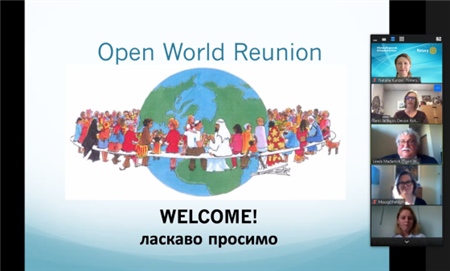By Natalia Kunzer, Open World Program Officer at Rotary International The Open World Program has adapted and built a solid record of virtual programming events for Open World delegates of 2020 and Open World Alumni in light of these uneasy times. The pandemic has shut opportunities for travel and all in-person Open World programs have been suspended since March 2020. While virtual meetings do not replace in-person ones, they offer vital opportunities during these unchartered times. Virtual programming is a useful tool for maintaining dialog and connections between Rotary hosts in the United States, local community leaders and Open World visitors from Eurasia. Our virtual events have included, but were not limited to, the following themes: - Local Legislators - Anti-Corruption
- U.S. Wastewater Treatment and Management with Linkage to Solid Waste Management System
- Agriculture focusing on Amalgamated Territorial Communities
- Energy Efficiency
- Partnerships: Social Business
- Development/Community
- Activism/Volunteerism
- Health focusing on Pediatric Ophthalmology
- Entrepreneurship
We have had virtual events for Open World delegations and alumni from Kyrgyzstan, Russia, Serbia, and Ukraine. Meetings with Open World alumni include discussions about what has happened since the delegation visited a local host community and how the pandemic has affected local communities and individuals. Aside from host families’ participation, we have local community leaders and U.S. counterparts join to discuss issues related to alumni’s professional sphere. For the Open World programs that have had to be postponed until international travel can safely resume, virtual events became a venue of introduction to host communities and clubs. For Rotary hosts, it is an opportunity to meet their Open World delegates who they will host in the future. Both sides are using presentations and short videos to enhance their stories. Rotary hosts also share how their clubs have had to adopt during these times of crisis in order to continue their work. For instance, clubs are using new fundraising techniques for virtual events to raise money to support local businesses and Rotary projects. These meetings also serve as preliminary discussions about joint projects and future visits. Even though these are virtual exchanges, they are traits of people-to-people diplomacy and a good way to stay connected and engaged. Throughout these months, our experience with virtual programs helped to rethink some of the programming aspects and will not be abandoned when the world resumes travel and meeting in person. We are so grateful to local Rotary host coordinators and host families who make the program what it is – topnotch content along with unforgettable experiences for Open World participants. Thank you for stepping up and providing generous support to Open World’s in-person programs and now to virtual programs for delegates and Open World alumni. In gloomy pandemic times, these meetings are rays of sunshine – hope for a brighter future. We look forward to a vibrant and productive year ahead! The Open World Program, operated by the Open World Leadership Center, an independent U.S. federal agency, is a special program available to Rotary clubs in the United States through a grant secured by Rotary International. The Open World Program was originally established as a Library of Congress–administered pilot project in 1999 to give emerging Russian leaders firsthand exposure to the American system of democracy through visits to local governments and communities in the United States. Since 2003 the congressionally sponsored program brings emerging leaders from the following Eurasian countries: Armenia, Azerbaijan, Belarus, Georgia, Kazakhstan, Kosovo, Kyrgyzstan, Moldova, Mongolia, Russia, Serbia, Tajikistan, Turkmenistan, Ukraine, Uzbekistan to the United States in order to give them firsthand exposure to the American system of participatory democracy and free enterprise. The principles of accountability, transparency, and citizen involvement in government are among the concepts emphasized by the Open World Program. The 2020 hosting year marks 21st anniversary of Rotary's participation in the Open World Program. Rotary International serves as a national hosting organization, with Rotary clubs serving as local hosts for Open World delegations. Rotary clubs in 280 cities and 48 states have hosted 3,726 of all 29,000 Open World participants throughout these years. RI is able to reimburse Rotary clubs for many of their hosting expenses through Open World grants. | 
